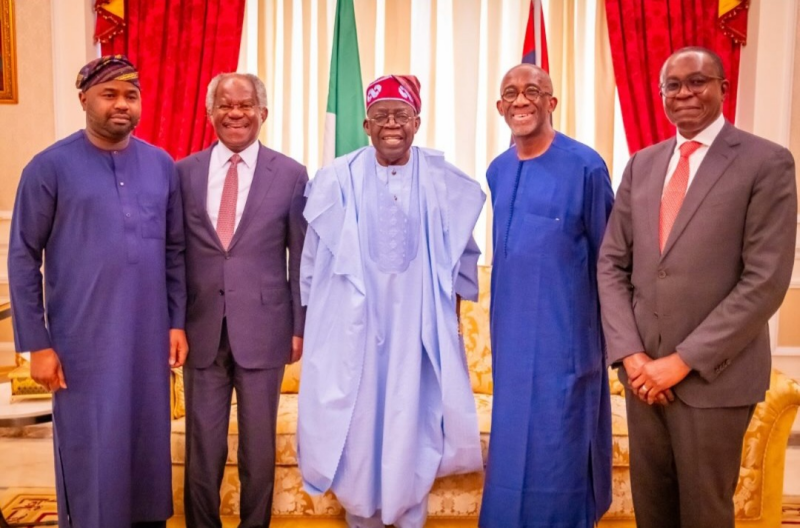
Reported by: Ime Richard Aondofa | Edited by Henry Owen
Lagos – In a significant move to position Nigeria as a premier destination for global capital, President Bola Ahmed Tinubu convened a high-profile meeting on Monday with leading international investors to discuss opportunities in the country’s energy and infrastructure sectors. The gathering in Lagos brought together prominent figures such as Hakeem Belo-Osagie, Chairman of Metis Capital Partners and Senior Lecturer at Harvard Business School; Bayo Ogunlesi, Chairman of Global Infrastructure Partners and Senior Managing Director at BlackRock; and Zacch Adedeji, Executive Chairman of the Federal Inland Revenue Service.
The discussions centered on unlocking large-scale investments in Nigeria’s upstream oil and gas industry and other strategic infrastructure projects aimed at fostering long-term economic growth. International investors lauded ongoing reforms, highlighting Nigeria’s potential to maximize its natural resources while modernizing infrastructure to meet global standards.
President Tinubu emphasized his administration’s commitment to transparency and an investor-friendly environment. “Nigeria is ready to collaborate with credible global partners to deliver energy security and infrastructure that will drive growth across Africa. Our sons of the soil and Nigerians in the diaspora are welcome partners,” he said, underlining the government’s intent to integrate domestic expertise with global capital.
Mr. Belo-Osagie highlighted the importance of sustainable financing in the upstream oil and gas sector. “Aligning investment with long-term value creation and sustainability is critical,” he said, noting that international collaboration could accelerate technology transfer and efficiency improvements. Similarly, Mr. Ogunlesi stressed that global capital could play a pivotal role in bridging Nigeria’s infrastructure gap, which has long hampered industrial growth and competitiveness.
Economic analysts view this engagement as a strategic effort to bolster Nigeria’s position as a hub for international investment. Dr. Chinedu Okeke, a leading economist, observed, “Meetings like this signal confidence in Nigeria’s reforms and investment climate. By tapping global expertise and funding, the government can address infrastructure bottlenecks and expand the energy sector—both of which are central to industrialization and economic stability.”
Public response has been largely supportive, particularly among business communities and civil society organizations. On social media, many Nigerians highlighted the potential benefits of these partnerships, from improved electricity supply and transport infrastructure to increased employment opportunities. One Lagos-based entrepreneur, speaking on condition of anonymity, said, “Better infrastructure and energy security will lower operating costs and attract more foreign investors, which can transform the business environment here.”
Experts warn, however, that the success of these engagements depends on consistent policy implementation and regulatory stability. Dr. Ifeanyi Adebayo, a development economist, noted, “Securing commitments from global investors is only the first step. Sustained growth will require transparency, sound fiscal management, and a clear framework for public-private collaboration.”
The meeting also reflects a broader trend of aligning domestic economic reforms with international best practices. Analysts suggest that such engagements can enhance Nigeria’s creditworthiness, attract industrial investments, and ultimately boost GDP. By facilitating access to global financing and technological expertise, the Tinubu administration aims to catalyze industrialization and expand employment opportunities, particularly in the energy and infrastructure sectors.
Social media users have been actively discussing the implications of the meeting. Many emphasized that increased foreign investment could have a ripple effect across multiple sectors, improving healthcare, transportation, and technology. A popular tweet read, “If Nigeria can get global partners to invest in energy and infrastructure, our economy could finally enter a new growth trajectory.” Civil society groups have also called for inclusive engagement to ensure that the benefits of foreign investments reach local communities and contribute to broad-based economic development.
Observers note that these efforts are part of a calculated strategy to integrate domestic policies with global expertise. By engaging with top international investors, the administration is signaling a commitment to sound economic management, collaborative development, and investment-driven growth. Analysts suggest that if sustained, such initiatives could position Nigeria as a continental leader in infrastructure and energy investment.
The meeting underscores the administration’s proactive approach to bridging financial and technological gaps in critical sectors. By fostering strategic alliances, the government hopes to stimulate innovation, enhance productivity, and attract both domestic and foreign investors. As Nigeria continues its reform agenda, partnerships with global investors are increasingly seen as essential to realizing the country’s economic potential.
In sum, the Lagos meeting marks a decisive step toward transforming Nigeria’s economic landscape. By combining robust domestic reforms with strategic global partnerships, the Tinubu administration is laying the groundwork for a more resilient, diversified, and inclusive economy—one that could redefine Nigeria’s role in Africa and the global investment ecosystem.
📩 Stone Reporters News
🌍 stonereportersnews.com | ✉️ info@stonereportersnews.com
📘 Facebook: Stone Reporters | 🐦 X (Twitter): @StoneReportNews


Add comment
Comments